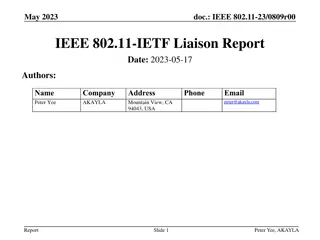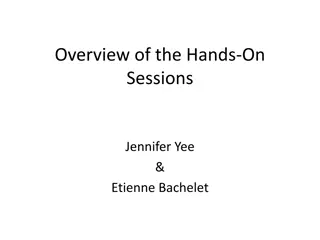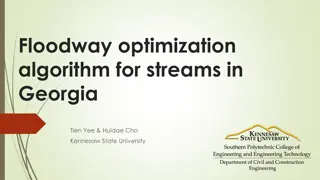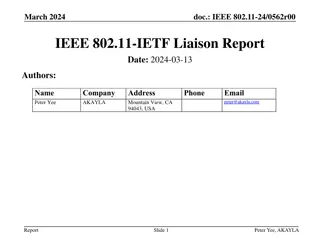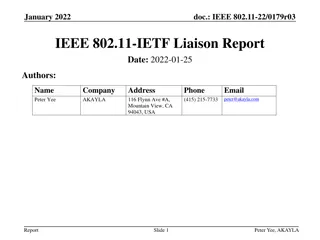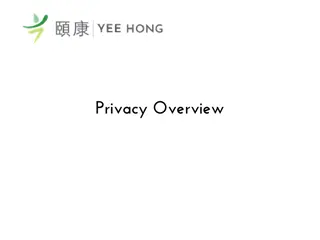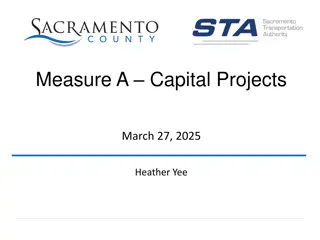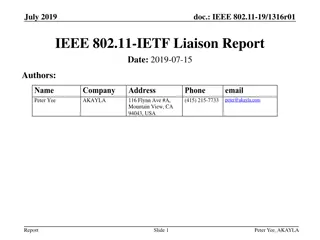
Framework for Equitable and Effective Undergraduate STEM Education
Explore the framework for equitable and effective undergraduate STEM education outlined by Dr. Sean Yee at the University of South Carolina to enhance teaching practices and support future faculty members. The framework covers various modes of teaching, technological roles, training needs, institutional infrastructure, and actionable recommendations to promote evidence-based teaching.
Download Presentation

Please find below an Image/Link to download the presentation.
The content on the website is provided AS IS for your information and personal use only. It may not be sold, licensed, or shared on other websites without obtaining consent from the author. If you encounter any issues during the download, it is possible that the publisher has removed the file from their server.
You are allowed to download the files provided on this website for personal or commercial use, subject to the condition that they are used lawfully. All files are the property of their respective owners.
The content on the website is provided AS IS for your information and personal use only. It may not be sold, licensed, or shared on other websites without obtaining consent from the author.
E N D
Presentation Transcript
National Policy Document to Frame Equitable and Effective Undergraduate STEM Education Dr. Sean Yee University of South Carolina Oktoberfest 2024
The committee conducted a two phase study. 1. Produce a discussion draft that outlines a framework for equitable and effective teaching. 2. Revise the framework, call out areas in need of further research, and provide guidance and recommendations for institutions, educators, and disciplines. Finishing Phase 2, Final Report due out in December K-12 (July, 2024) Undergraduate (December, 2024)
Charge of Study Present a framework for equitable and effective teaching that includes attention to: Approaches to and guidelines for evidence-based, inclusive teaching; Equitable and effective teaching practices for different modes of teaching 1. (e.g., in-person, online, blended and hybrid teaching), and different educational contexts (e.g., 2-year colleges, hybrid program, research institutions); The roles that technology does, or can in the future, play in supporting equitable and effective teaching. 1. Discuss the experiences and training opportunities graduate students and postdoctoral students will need in order to be prepared to employ equitable and effective instruction as future faculty members. 2. Examine the institutional infrastructure, policies, and practices needed to encourage and support evidence-based teaching, such as opportunities for professional development, faculty evaluation policies and practices, and reward and advancement systems. 4. Provide actionable recommendations for institutions, disciplinary societies, funders, and policy makers on steps that could support implementation of the framework.
Full Public Draft https://nationalacademies.org/docs/DEB1E504F32652B916F1716BE61F4DAF70 04DDA4BDDA
7 Principles for the Framework Cannot Separate Equitable and Effective. Each principle is not designed to work alone. Each principle is described so that it will be embedded at multiple levels Student Classroom Instructors Coordinators Administration Institution
15 Minute Think-Pair-Share Prompts: Which principles are you most comfortable implementing? Why? Which principles are you most uncomfortable implementing? Why? Which principles do you agree with or disagree with implementing? Why? What principles do you feel are missing?
10 Minute Share Out and Questions Prompts: Which principles are you most comfortable implementing? Why? Which principles are you most uncomfortable implementing? Why? Which principles do you agree with or disagree with implementing? Why? What principles do you feel are missing?
Thank You! Dr. Sean Yee yee@math.sc.edu


